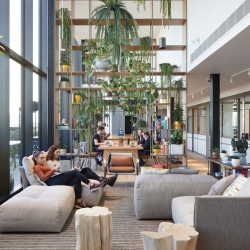To provide the best experiences, we use technologies like cookies to store and/or access device information. Consenting to these technologies will allow us to process data such as browsing behaviour or unique IDs on this site. Not consenting or withdrawing consent, may adversely affect certain features and functions.
The technical storage or access is strictly necessary for the legitimate purpose of enabling the use of a specific service explicitly requested by the subscriber or user, or for the sole purpose of carrying out the transmission of a communication over an electronic communications network.
The technical storage or access is necessary for the legitimate purpose of storing preferences that are not requested by the subscriber or user.
The technical storage or access that is used exclusively for statistical purposes.
The technical storage or access that is used exclusively for anonymous statistical purposes. Without a subpoena, voluntary compliance on the part of your Internet Service Provider, or additional records from a third party, information stored or retrieved for this purpose alone cannot usually be used to identify you.
The technical storage or access is required to create user profiles to send advertising, or to track the user on a website or across several websites for similar marketing purposes.
 A new research report released by Siemens Smart Infrastructure, titled ‘A New Space Race,’ has highlighted the increasingly urgent need to transform global infrastructure to focus on adaptability, resiliency and decarbonisation. Data from the report claims infrastructure leaders worldwide recognise the need for digitalisation to tackle challenges in energy systems and the built environment. (more…)
A new research report released by Siemens Smart Infrastructure, titled ‘A New Space Race,’ has highlighted the increasingly urgent need to transform global infrastructure to focus on adaptability, resiliency and decarbonisation. Data from the report claims infrastructure leaders worldwide recognise the need for digitalisation to tackle challenges in energy systems and the built environment. (more…)









 According to
According to 
 Hybrid working could save the NHS more than £4 billion per year by giving workers more time to look after themselves and their families, according to a new study by
Hybrid working could save the NHS more than £4 billion per year by giving workers more time to look after themselves and their families, according to a new study by 


 The World Green Building Council (
The World Green Building Council (
 Just 41 percent of UK organisations are on track to meet the Government’s target for net zero carbon emissions by 2050, according to new research released by Dr Chris Brauer,
Just 41 percent of UK organisations are on track to meet the Government’s target for net zero carbon emissions by 2050, according to new research released by Dr Chris Brauer, 
 The
The 
 In just two weeks, the much-anticipated
In just two weeks, the much-anticipated 
 Through analysis of mobility, technology, business and environmental data, London ranks as the number one most intelligent and future-proof city for cities with a population of over three million people, with New York and San Francisco taking second and third place respectively, according to a new index from
Through analysis of mobility, technology, business and environmental data, London ranks as the number one most intelligent and future-proof city for cities with a population of over three million people, with New York and San Francisco taking second and third place respectively, according to a new index from 










November 10, 2021
Working culture should align and balance with commercial objectives
by Siobhan Byrnes • Comment, Flexible working, Property, Wellbeing